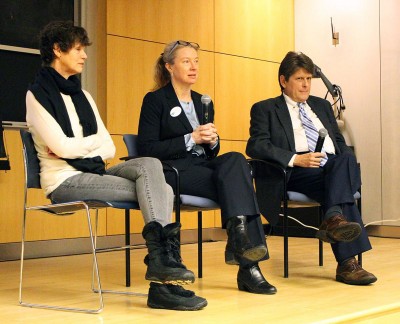
A mix of students, parents and faculty attended a forum on climate change and fossil fuels Thursday evening, sponsored by Boston University faculty and Divest BU, an on-campus group that encourages BU to divest from fossil fuel companies.
Approximately 80 people attended the forum, which was held in the Life Science and Engineering Building.
The purpose of the evening, according to the group’s website, was to educate students and adults about university funds that go into fossil fuel investments and the implications it has on climate change.
Lisa Goldberg, a statistics professor at the University of California, Berkeley and the night’s first speaker, focused on the financial implications of divesting from fossil fuels and the kind of impact it would have on BU.
“I believe global warming is a serious problem and want to badly try and mitigate the damage that we have done today and to make things better,” Goldberg said in her presentation. “I do think it’s really important to understand what we know and what we don’t know.”
She presented a graph showing little difference in equity by moving investment funds away from fossil fuels companies and into other investments.
Leslie Samuelrich, president of Green Century Capital Management, leads investment strategies overseas and said her goal is to get firms to divest and help manage their investments.
“We do our advocacy principally with non-fossil fuel companies around climate change,” Samuelrich said in her presentation.
She spoke about the moral, political and financial reasons to divest and why there are risks to investing in fossil fuel companies, and she presented graphs to back up her claims.
“The divestment movement has been the biggest energizer around the climate change movement that I have seen, and I don’t see any sign of it slowing down,” she said in her presentation. “It’s a very, very important tactic or strategy depending on how you look at it to forward what we need to do on climate policy.”
Bob Massie, co-founder of Global Reporting Initiative, another speaker, said in his presentation that climate change is a huge problem in the United States. He said the energy field has been going down and is actually a bad investment.
“We have this immense problem at this accelerating speed,” he said. “Coal is dead. External cost of coal is not a viable economic entity.”
One of the forum’s organizers, Jennifer Luebke, an associate professor of anatomy and neurobiology in the School of Medicine, said climate change and divestment are important issues that should be open to debate and dialogue. She said BU President Robert Brown has welcomed this, leading to the creation of Thursday night’s event.
“This meeting was designed to foster the conversation at Boston University around the issue of climate change and what responses the university can have on a change, basically on finance implications and the social impact on fossil fuel has had,” she said. “The fact that we filled the entire auditorium shows the kind of influence this issue has on people.”
Stephanie Henry, a graduate student at the Graduate School of Arts and Sciences, said she attended the forum because she is ardently interested in the subject of fossil fuel divestment.
“I am passionate about how the university can respond to the climate change,” she said. “I thought there was a good range of speakers. Each speaker had a unique background that gave an interesting perspective on the implication of diverting on fossil fuels.”
John Harris, a student in the Evergreen Program at the Metropolitan College, said he was among the crowd members who attended the forum because divestment from fossil fuels is becoming a hot topic on campus.
“The point was to make political awareness of the environment damage,” he said. ”I thought I would check it out. They gave a helpful perspective.”





















































































































